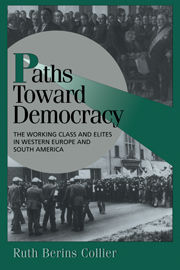Book contents
- Frontmatter
- Contents
- List of Figures and Tables
- Acknowledgments
- 1 Introduction: Elite Conquest or Working-Class Triumph?
- 2 Elite-Led Reform in Early Democratization
- 3 Political Calculations and Socialist Parties
- 4 Labor Action in Recent Democratization
- 5 Comparing the Patterns: The Working Class and Democratization
- Bibliography
- Index
1 - Introduction: Elite Conquest or Working-Class Triumph?
Published online by Cambridge University Press: 05 June 2012
- Frontmatter
- Contents
- List of Figures and Tables
- Acknowledgments
- 1 Introduction: Elite Conquest or Working-Class Triumph?
- 2 Elite-Led Reform in Early Democratization
- 3 Political Calculations and Socialist Parties
- 4 Labor Action in Recent Democratization
- 5 Comparing the Patterns: The Working Class and Democratization
- Bibliography
- Index
Summary
The role of the working class in democracy and democratization is a classic and contested question. Earlier formulations centered around the historical experiences of the nineteenth century and the opening years of the twentieth, particularly in Western Europe. With the renewed interest in democracy stimulated by the “new” democracies of the 1970s and 1980s, this question has been revived in more recent literature and has become contested once again. This book revisits the working-class role in democratization on the basis of a comparative analysis of these historical and contemporary episodes of democratization in Western Europe and South America.
The question of the working-class role in democratization is part of a long-standing debate concerning liberal democracy, understood as a particular set of institutions. Is a democratic regime a result of a victory from below, in which subordinate or excluded groups wrest power from a reluctant elite, or a conquest from above, in which those in power or rising economic groups not holding power pursue their own political agendas and seek to strengthen their political positions? That question is closely related to another concerning the nature of liberal democracy: what is the relationship between liberal democracy and authentic rule by the people, or popular sovereignty, however that may be understood. In the Marxist tradition, of course, the issue was framed in class terms, and the debate centered around democracy as either a mechanism of capitalist rule or a triumph of the working class.
- Type
- Chapter
- Information
- Paths toward DemocracyThe Working Class and Elites in Western Europe and South America, pp. 1 - 32Publisher: Cambridge University PressPrint publication year: 1999



